

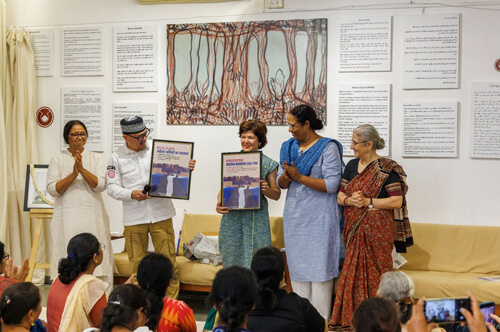
Declaration of November 2nd as International Day for achieving voice, visibility, validation of women workers in the informal sector in honour of Elaben. Poster release declaring November 2 an International Day for achieving voice, visibility, validation of women workers in the informal sector in honour of Elaben. (left to right) Jyoti Macwan, Hidayat Greenfield, Svetlana Boincean, Manali Shah, Renana Jhabvala.
In a befitting tribute to the relentless work of SEWA’s founder Elaben Bhatt to organise and empower women working in the informal sector, the IUF – International Union of Food, Agricultural, Hotel, Restaurant, Catering, Tobacco, and Allied Workers’ Associations – on Thursday announced celebrating November 2 as the International Day for Unorganized Women Workers. Elaben passed away on November 2, 2022.
The announcement, which is a major endorsement of Elaben’s life and work dedicated to women in the unorganised sector, was made at the SEWA Reception Centre where Hidayat Greenfield, Regional Secretary of IUF for Asia Pacific and Svetlana Boincean, International Officer for Agriculture and Plantation at IUF, joined SEWA’s Jyoti Macwan, Manali Shah and Renana Jhabvala along with SEWA sisters from all states.
Jyoti Macwan, General Secretary of SEWA, said that the membership of SEWA has increased from 21 lakh to 29 lakh, and the organization is ever-expanding. “This was the place where Elaben carried out knowledge sharing sessions ‘Baudhik Shala’ for 30 months. Here she taught us how to think. If I just make a list of the topics she covered, it would be humongous from religion to environment and society to leadership. Two things that stayed with me from all the interactions was the message of truth and simplicity,” she said. The members of SEWA responded with a resounding yes when Macwan said that they would be celebrating 100 years of SEWA, too.
SEWA, founded in 1972, completed 50 years in 2022. Manali Shah, National Secretary of SEWA, in her speech, said that creative and enthusiastic women workers have the potential to bring justice in the world through their work. As the event saw the unveiling of ‘Bolti Bheent’ or ‘Speaking Walls,’ Shah gave context to it, saying that the exercise is to give visibility to largely invisible women workers. “The three ethos of voice, visibility and validity are fulfilled by this wall. I remember that when we were discussing hanging the pictures on the wall, Elaben had said that it is not a museum, and the wall should be full of pictures which are of the women who are still working,” said Shah.
“Work is an important part of their lives and identity as women, they are still not getting the due credit from their employers, middlemen or contractors nor from their family members. What Elaben calls Anubandh is a bond of interconnectedness.”
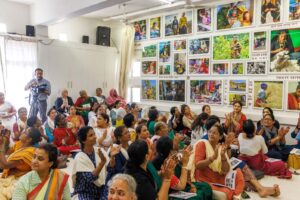
She added that the wall from its concept to execution has taken more than two years. Apart from 70 pictures, the wall also has SEWA manifesto in different languages, and a picture of the banyan tree – a homage to the first meeting place for Elaben in Victoria Garden.
Renana Jhabvala, a long-term associate of Elaben, gave a perspective on the SEWA Reception Centre, saying that when Elaben did not have a permanent place to meet the worker women, she had come in contact with Mr. Charles Ford, General Secretary, International Textile, Garment and Leather Workers’ Federation (1971 to 1988). When she explained the need for a place for women, he exclaimed, “Oh, you want a Reception Centre.” The name remained stuck, she said. She also remembered Elaben’s travels across the country and her transforming journey for taking SEWA to other parts of India. “As we are here, Elaben is also here in our hearts and minds. The members are taking forward her dream and vision for women of India as SEWA is a proud member of IUF and organizations such as ITGLWF,” she said.
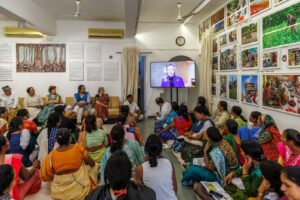
A few associates of Elaben also shared their experiences. Several international dignitaries including former Ireland President and a fellow Elder Mary Robinson and Eileen Alma, Executive Director of Canada-based Coady Institute paid tribute through video messages during the event. Robinson said that Bhatt’s idea of 100-mile communities was an interesting one. “Today SEWA is working towards the Clean Sky initiative and also Project Dandelion for women-led climate justice,” she said. Alma remembered Elaben as an inspiration for many and said that Coady Institute has constituted a scholarship on the occasion.
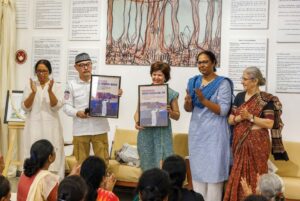
Greenfield in his speech said that they at IUF are as much part of SEWA as SEWA is part of IUF. He said that the passing of Elaben in 2022 was devastating but they are responding to it not with sadness but with strength. “The resolution for celebrating 2nd November as the International Day for Unorganized Women Workers was passed on 16th June in the IUF executive meet where member organizations from 126 countries had participated,” he said. Greenfield added that the crux of Elaben’s message is included in a poster that is prepared in 14 global languages. “It would be distributed on occasions such as International Women’s Day to spread the message of voice, visibility and validation.”
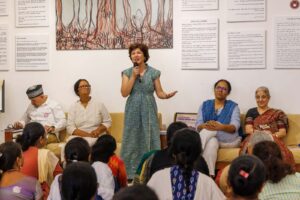
Svetlana Boincean, International Officer for Agriculture and Plantation at IUF, who represented the organization, said that SEWA today plays an important role at IUF and that the day is about Elaben, and also about what a collective strength of women can achieve. “The issues such as gender inequality and pay disparity are very much relevant today – Iceland, one of the countries known for its gender equality, last week observed massive strike for demand of equal pay!”.